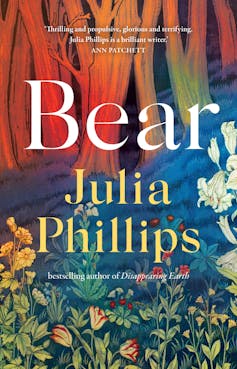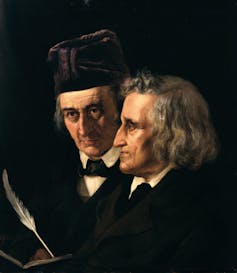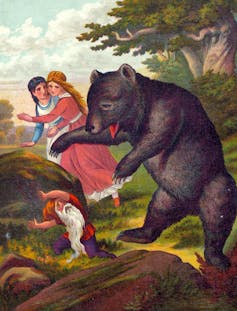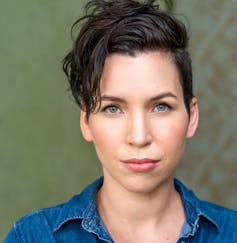With her second novel, Bear, Julia Phillips consolidates her position as a leading novelist of cartographic fringe areas.
Her first novel, Disappearing Earth, which was shortlisted for the National Book Award and named one of the ten best books of 2019 by the New York Times Book Review, is set on Russia’s remote Kamchatka Peninsula; her second novel takes us to the remote island of San Juan in the Pacific Northwest of the USA.
Review: Bear – Julia Phillips (Scribe)
Bear is a post-pandemic novel with a fairy-tale twist. It begins as a story about the protagonist’s developmental disability. At 29, Sam’s dreams have stalled. She lives with her older sister Elena, who cares for their incapacitated mother, a 51-year-old former nail technician who has terminal lung cancer from excessive exposure to solvents.

Sam serves candy on the San Juan ferry for a measly $24 an hour – a drop in the bucket when you have bills to pay. She was unemployed during the two years of COVID-19 lockdowns that decimated the region’s vital tourism sector. Relying on Elena’s salary as a bartender at the local golf club, Sam and her family desperately need this second income.
Sam is deeply upset at having to serve the super-rich eco-tourists and luxury holiday home owners who see the island as their temporary playground and the local service staff as expendable “pawns.” Their reality is precarious work, exorbitant medical bills and mortgage payments.
Economic hardship alienates the sisters from their surroundings, even though they live in one of the most sublime places on earth. Sam is disillusioned with an island she loved as a child: a wilderness with dramatic cliffs, humpback whales, deer, sea lions and bald eagles circling overhead.
Suffering from the scars of being teased by the wealthy young islanders during her high school years because of her poverty, Sam shuns any chance of friendship and the possibility of romance with her potential boyfriend Ben, a more free-spirited mainlander who works as a ferry crew during the tourist season. She focuses instead on her plans to sell her house and move off the island after her mother dies.
These tensions reach a climax when something unexpected, even mysterious, appears on their doorstep: a grizzly bear. Fleshy, smelly, furry – the bear is both real and unreal. Something extraordinary has brought the animal to this place. Black bears are occasionally sighted on San Juan Island, but the appearance of a grizzly bear is unprecedented. It is not just a potential physical threat, but a manifestation of the forces that threaten to tear the sisters apart.

Public domain, via Wikimedia Commons
The grizzly changes the course of their lives. Elena and Sam interpret his unusual appearance as a symbol and understand it. Both believe that they are living in a fairy tale from the books of the Brothers Grimm, although they attribute different meanings to the bear.
For Elena, the bear is a miracle. “What is happening here is not dangerous,” she argues. “It is magical. It is the best thing that has ever happened to us.” Her bear represents the opposite of everything her absent stepfather represented. As a parent, he was supposed to be her protector; instead, he turned out to be abusive, vicious and violent. The bear, on the other hand,
swam miles in the wet, black night to get to their home. Made exceptions to itself, to them, to every rule. It was supposed to be rough, but was gentle instead. It was supposed to be wild, but acted like it was tamed. It met Elena on the way as gently as a suitor.
For Sam, the bear represents the opposite: danger, violence, chaos, instability. Its appearance symbolizes her growing distance from her sister, the breaking of their unbreakable sisterhood – the only comfort she could cling to and rely on in her otherwise dreary life.
Human or bear?
Elena’s strange relationship with the bear gradually reveals that her adulthood has not stalled to the same extent as Sam’s. She is not enthusiastic about Sam’s escape plans. Her circle of friends, her secret boyfriend and her increasingly close relationship with the grizzly bear a threat to Sam, who is completely dependent on her sister.
The protagonists thus struggle to reconcile two bears: the real bear on their doorstep, wild, mysterious, untamed, powerful; and the bear as a metaphor and symbol of all the discontent they want to keep at bay. The novel openly alludes to fairy tales (especially Snow White and Rose Red) and their Freudian tropes, which can sometimes become cloying – for example, when Sam imagines her sister as a little girl lost in the woods and pursued by a big, bad monster.

Public domain, via Wikimedia Commons
Every fairy tale has to have a villain. Sam and Elena initially cast the role in the young, elegant State Department biologist Madeline Pettit. Pettit warns them to stay away from the bear, both for their own good and for the bear’s. They refuse to listen to her, because they resent her for interfering in their lives, but even more so because she draws attention to the wedge the bear has already driven between them.
Her mother’s ex-boyfriend also fits the villain stereotype of the evil stepfather. But although he is portrayed as a source of unpredictability, violence, and domestic discord, he plays only a minor role in the story and never develops into a fully developed character.
His memory, not his presence, is a source of repression that legitimizes the sisters’ determination to escape into a fantasy world. In fact, when they encounter him at a family funeral, Sam mutters, “He’s even scarier than the bear” – an echo of recent hypothetical online debates about whether a woman faced with a strange man and a bear in a forest would “choose the bear.” Many women, including Elena, apparently, would indeed choose the bear.
Protective hostility
Although Bear is Phillips’ second novel, it feels less evenly developed and complex than her first, which interwoven multiple narrative voices. It is written in the third person and largely adopts the straightforward style of young adult fiction that suits the protagonist’s worldview. But the novel’s narrow focus on the unforgiving Sam, who misreads not only the bear but almost all of the other characters, makes the first two-thirds of the novel somewhat constricting.
The protective hostility that Sam exudes makes her unsympathetic, even if the reader can empathize with her plight. But Phillips risks making her protagonist entirely unsympathetic by emphasizing Sam’s growing dislike for the novel’s most compelling element: the bear.
What if Moby-Dick were told not by Ishmael, who opens the reader to the mysteries and beauty of nature beyond the human, but by the vengeful Ahab, who seeks to destroy the whale and all the possibilities it represents?
Although Sam is by no means an Ahab, she plans to destroy the bear. The novel treads dark territory by focusing on her hostility toward the creature, which the reader cannot truly hate, rather than Elena’s miraculous point of view or even Madeline’s environmentalist point of view.
While it is difficult to stomach Sam’s misjudgments, her unlikability stems from her desperation to escape reality by retreating into fairy-tale delusions. In the novel’s thrilling final pages, Sam and Elena’s argument climaxes in an ultimate encounter with the grizzly. These are the book’s most philosophically profound pages. The ending is a powerful meditation on human nature and the stories and fictions we tell ourselves to endure it.
The ultimate villain
Bear is particularly interesting as a commentary on the puzzles of our relationships in late capitalism. It examines the pressures of family life, hardship, loss, broken dreams and our fragile relationship with nature.
These themes are contextually anchored in the heightened uncertainties and disconnections of the pandemic, which have exposed the pressures of a society where the economy is driven by greed, with little regard for nature or human flourishing. The novel describes a world where work has been compartmentalized into a precarious workforce with limited rights, and where health and social care systems neglect the poorest and most vulnerable members of society.
The sisters’ rhythm of life is completely dependent on the schedules of their companies. Sam cannot take enough time off to grieve or care for her mother without getting further into debt. Her mother’s unpaid medical bills threaten to drive the family into bankruptcy. The bank wants to foreclose on their house, robbing Sam of her only imaginary ticket off the island.

Nina Subin/Writer
An extraordinary encounter with a wild animal is presented as the ultimate contrast to the banal rhythms of the working class, which robs the human experience of all magic. In a world of coldly rationalized numbers, detached from the experience of poverty, who would not prefer the bear – or at least the wonder and beauty it symbolizes – to the monster of capital, which, as Marx famously put it, “lives like a vampire only by sucking living labor”?
That’s Elena’s logic, at least; Sam remains skeptical. The novel’s tragic twist reveals, with strong irony, the extent of both sisters’ delusions. Biologist Madeline is proven right in a way that shatters all superstitious notions about the possible cause of the bear’s arrival and its significance. The novel implies that there was always a more mundane explanation: climate change, overfishing, and the unusual traffic disruption resulting from lockdowns during the pandemic had disrupted the bear’s normal feeding and migration patterns.
Bear plays with the lines between fantasy and reality that constrain working-class life. Through the story of a naive person lost in their struggle with poverty and a falling family, Phillips reveals the external forces that lead people to create irrational ideas about themselves and the world. Although the novel ends in tragedy and devastating loss, the bear is not the villain of the story. Nor is the scientist or the evil stepfather, or even Elena or Sam and their poor choices. The real villain is capitalism, which sows divisions among ordinary people and drives a wedge between humanity and nature.




